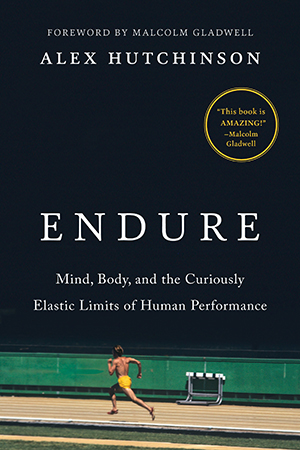 By Bookwork Sez
By Bookwork Sez
You need a shave.
It’s been awhile and, though you’ve been grooming and growing, you’re long overdue — so, maybe just a little off the top. You’ll feel a lot better when you do, and in the new book Endure by Alex Hutchinson, you’ll see how your body will adapt on track, path, ocean, drift, and desert.
Prior to 1954, it was believed that the human body was physically incapable of running a mile in less than four minutes — until the late Roger Bannister put that notion to rest quite handily. As for today, the belief that a marathon of 26.2 miles can’t be finished in under two hours still holds — but barely.
When it comes to endurance, effort, and the human body, we’ve long been fascinated with possibilities. The questions, in fact, go back centuries and countless tests and studies have been (and are being) done to determine answers when a hundredth-of-a-second means something. Still, one thing’s for sure: says Hutchinson, “the will to endure can’t be reliably tied to any single physiological variable.”
Much of the matter of endurance has to do with “the need to override what your instincts are telling you to do…” Perhaps not surprisingly, it very much has to do with the brain, “but not in the simple it’s-all-in-your-head manner of self-help books.” The science of it all is “complex,” made even more so by outliers who, for any number of reasons, can and do achieve beyond preconceived limits — which is to say that we still don’t know where the “ultimate limits” lie.
The stories, even so, are tantalizing.
Hutchinson writes of Henry Worsley who, at age forty-eight, tackled a South Pole trek that “demanded every ounce of his reserves.”
Hutchinson shows how early scientists helped save the lives of the men who built Hoover Dam. He examines how we pace ourselves, sometimes sub-consciously; why we do better after we’ve suffered; and how hypnosis may increase strength. He explains how deep diving and high climbing pose the same questions; why marathon runners are shrinking; why thirst shouldn’t matter; what diet can do; and how none of this may matter in the future.
We’ve all known that can’t-go-another-inch feeling when a surprising well of reserve is suddenly present. Where did that come from? Can you utilize it at will? In Endure, you’ll see, but first: this is not just a book for athletes.
While it’s true that author Alex Hutchinson writes extensively about men and women who participate in extreme, even elite, sports, the lip-biting anecdotes inside Endure prove that this is a book for anyone who might find themselves in inclement weather or unusual situations.
Yes, it’s mostly about athletic endurance, but its everyday relevance lies in the science Hutchinson brings which, though sometimes a bit too deep for the casual reader, is applicable whether you run to finish line or fridge.
Athletes and trainers, of course, will soak this book up, and adventurers will jump for it. Even couch potatoes should enjoy it because Endure is razor sharp.
Endure:
Mind, Body, and the Curiously
Elastic Limits of Human Performance
by Alex Hutchinson, foreword by Malcolm Gladwell
c.2018, Wm. Morrow
$27.99, 306 pages

